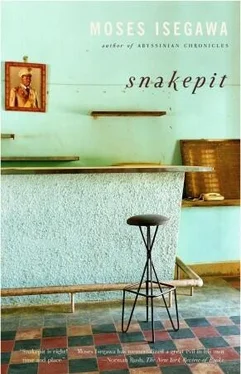At last, the circuitous journey ended. They drove through a gate: he could hear the guards barking, growling, and the gate banging to a close. The vehicle then dipped and braked. They pulled him out and marched him up a flight of stairs, then down some corridors. They dumped him in an underground storage space, freed his hands, ripped the cloth off his face, and switched on the light. It was a large room with a single spring bed, a fingerthin mattress, a torn blanket and a basin. The window was shoe-box small and looked out onto the yard. He could see lights winking, beckoning from far away. So they were not going to kill him tonight. He sighed. He sat on the bed and tried to think. Was this about work? Did the General want him to leave, now that the ministry had been cleaned up? Maybe the Saudi prince had struck as he had threatened. Uganda was a runaway, slave to neither the slide-rule nor the crystal ball. Patience worked better than empty speculation.
Up till now there had been a thrill to living, each day a mystery, a package full of anticipation. The sting of guilt had intensified the thrill. Now that they had caught up with him, he felt calm and the calm decapitated his temper. Uganda was a land of guilt, where sons were sometimes held accountable for the sins of their fathers and grandfathers. Guilt was not altogether negative. Admitting it could help you work out a plan of survival. Right now innocence was the foe. It tempted you down the slippery road of sentimentality and self-pity, a lethal combination at the best of times. By thinking that he was paying for his sins, Bat found the strength to go on. After all, his punishers were not in any moral position to judge him. By taking his punishment like the guilty man he was, he was giving pain its proper place in the scheme of things, and with his burden lightened, his inner strength increased or remaining level. He felt abandoned, like many other Ugandans, left to fight for his life all alone. He wasn’t the first; neither would he be the last. He had no personal regrets. He did not wish to flee the country. He only wanted to get out of detention with as little damage as possible.
Contrary to expectation, he slept. In the morning a soldier opened the door and ordered him to take up his basin. Was he going to be forced to breakfast on his faeces? On the turd that now swam in his urine? He could of course empty the basin on the soldier, get kicked and rifle-butted to a pulp, and dangle on the lip of his own grave. But he marched out of the room, his evidence of mortality carried out in front of him like some holy sacrifice.
On the way he saw other prisoners, some dressed, some in different stages of undress. Some looked fat, some skinny, bones glaring. Some were injured, limping, swollen, bruised; some looked scratch-free like presidential Boomerangs. They were all joined together by the sounds of silence, water splashing, the wheezing, the sneezing, the coughing.
After disposing of the faeces in the latrines and washing up in the common bathrooms, he was led back to his room. He looked out the window and could see part of a compound, a concrete wall and leaves of a leafy tree. Beyond was part of a lane, chalky buildings, movement. The familiarity of it struck him. It dawned on him that he was in the basement of the Parliament Building, a mere hundred metres from his office! Is this a joke? he asked himself.
The building had a long history of detention and misuse. Amin’s predecessor, Obote, had his offices here, security agencies on floors above and below him. Political detainees were held here, and he could listen in as his boys worked over his favourite prisoners. On the steps of this building, somebody shot him in the jaw, but the grenade thrown to finish him off did not explode. In the turbulent sixties, four cabinet ministers were held here. The main difference between then and now was that prisoners were more likely now to receive a speedy death. Amin did not like wasting the taxpayers’ money on feeding people destined to die.
For detention purposes the building was perfect: it was big, impregnable, communications-friendly. Prisoners could look out, catch glimpses of what they were missing, till they gave in or went nuts. It occurred to Bat that the Parliament was never free of the dirty hand of corruption, right from the time of empire till now when it ostensibly served as the clearing-house of inequity and injustice. Its workings had deepened Bat’s cynicism and his conviction to stay out of politics. Now he was imprisoned in its very bowels.
At the end of the day he received a prison uniform: a coarse white cotton shirt and shorts. Also, a pair of sapatu, thin bathroom sandals. Routine set in: Thin porridge for breakfast. Posho and beans on an aluminium plate for lunch and supper. Time started to sit on him, crushing him, like the ass of a hippo, he thought.
THE NEWS of Bat’s disappearance did not break; it just seeped drop by drop into the consciousness of those concerned. Babit felt it as the sundering of a now familiar routine. They used to wake up each morning at six. She was usually the first. She would greet him, remove his hands from her body and go to the bathroom. He would roll off the bed, draw the curtains, stand at the window to see what kind of morning it was. He hated rainy mornings because of the mud. He didn’t want his XJ10 bespattered. He would stand there yawning while she prepared his bath. She insisted on scrubbing his back, launching him into a new day with firm fingers. While he completed his bath, she would go see to breakfast. She wanted to make sure that the cook had boiled four green bananas in salt water, with a tomato, to the right softness. She would see to the tea, the boiled egg, the greens. By the time she was ready, she would hear him calling her to check if he looked good, if the tie was straight, if it matched the shirt and the shoes. She would give her approval and announce breakfast. The bananas would arrive on a plate swimming in meat soup. She would sit opposite him and watch him eat, drinking a cup of tea to warm her stomach.
On his feet again, he would thank her, fuss her hair as he left the table and head for the bedroom. He would take his briefcase to the garage and park the XJ10 in front of the house. She would stand in the doorway, dressing gown wrapped round her, hair fanning out, and see him off. The flamboyance of the car worried her sometimes. Didn’t it draw too much attention, too much envy?
The rest of the day was hers to do with as she liked, freed like a parish priest after the bishop’s visit. She would bathe, do her hair, and prepare herself for the day. She would breakfast, note things to buy, clothes to be washed, surfaces to be cleaned and polished. In the afternoons she sometimes went to town, visited friends, had a siesta or did some reading in preparation for a teaching course she wanted to take some time in the future.
They had recently agreed that on a day or two each week he would drive home for lunch. On that particular day everything was prepared early so that by midday the food was ready. She would put on her best clothes, jewellery, shoes, and wait for him, like a bride expecting her groom. The car’s distinctive sound would fetch her to the door. She would see him rush in, tie loosened, the first two shirt buttons open. A quarter of an hour later they would sit down at table and eat. He would tell her jokes, stories about people who had showed up at work, how they spoke or behaved. If she had stories to tell, he would listen. If not, he would dominate the conversation, teasing, entertaining. Time often cut him short. She would see him off, exhaust heat from the car leaving a hot spot on her leg where it puffed at her, burning fuel lingering in her nose.
The afternoons were slow. There was so much time before he returned. They usually ate supper at ten. If by then he was not yet back, she would eat alone. This time when he did not show up, she expected to see him in the morning. She assumed that he got caught up, what with meetings with ministers and so many things to do. By midday the following day she was restless, wondering whether this was going to be the first of many strange and unfamiliar hours. She called his office again; he was not there. She called Mrs. Kalanda. Mrs. Kalanda contacted Bat’s office and was told he was not there. She reported the case at the Central Police Station in Kampala. Babit contacted local police in Entebbe.
Читать дальше











